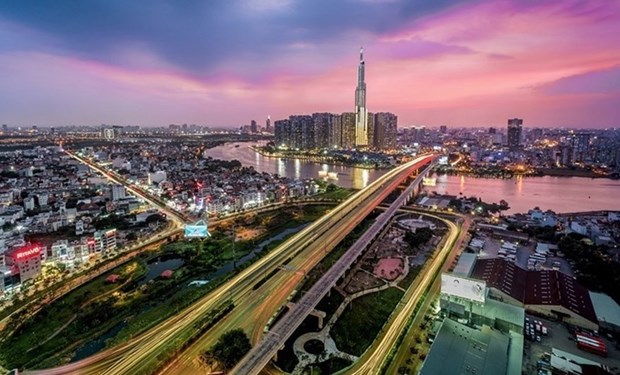Vietnam is an investment destination in post-pandemic period: Bangkok Post
Investment during the pandemic has proved challenging for investors across the globe. However, hopes for this top-performing Asian economy are growing as the Vietnam market has outperformed other international peers thanks to its GDP growth amid COVID-19 last year, according to the Bangkok Post.

Ho Chi Minh city is the most dynamic economic city and financial hub of Vietnam. (Photo: laodong.vn)
The pandemic has indeed dampened the high growth seen in early 2021 and the GDP growth for the first nine months is less than the market forecast at 1.4 percent. Nevertheless, Maetha Peeravud, Assistant Vice President – Fund Management Group, BBL Asset Management, believed Vietnam’s economy has passed the lowest point.
“Looking three to six months ahead, the outlook for the Vietnamese economy is positive,” he was quoted by the Bangkok Post as saying.
The COVID-19 vaccination rate is increasing with large cities like Ho Chi Minh City and Hanoi already giving the first shot to over 90 percent of their population, Maetha said, adding that the country is expected to achieve herd immunity in the first or second quarter of next year.
Geographically, Vietnam has a strategic location for its high-performing export sector. With the focus on education, free trade agreement, and labour skill enhancements, the global supply chain has paid great attention to Vietnam, including Samsung, the Korean multinational manufacturing conglomerate, which allocates over half of its mobile phone manufacturing capacity to Vietnam.
 Illustrative image. (Photo: VNA)
Illustrative image. (Photo: VNA)Maetha agreed with Bloomberg’s positive outlook, identifying three major big long-term themes.
First, urbanisation in Vietnam will lead to a demographic dividend, namely the economic growth resulting from a change in the age structure of the population.
Over half of the Vietnamese population is under 35. The number of workers in the industry and service sectors is increasing while that in agriculture is decreasing, suggesting a major shift toward higher income generation.
Secondly, Vietnam is benefiting from industrialisation growth from foreign direct investment (FDI).
Vietnam enjoyed strong support in developing more advanced technology and high-skilled labour training from global technology companies, which would in turn help produce more premium products, he said.
According to Maetha, digitalisation is the third factor contributing to Vietnam’s growth.
Along with its 5-year plan, the Vietnamese government also targets the digital economy share of GDP to grow from 5 percent in 2019 to 20 percent in 2025, he said.
In addition to economic growth, the Vietnamese equity market is bullish with many catalysts.
Jeff Suteesopon, ASEAN Equity Portfolio Manager and Vice President – Fund Management Group, BBL Asset Management, said the market capitalisation of the three stock exchanges in Vietnam is around 7 trillion baht, compared to Thailand’s 18 trillion baht, suggesting an opportunity to grow.
Another catalyst is its valuation, Jeff said. Even with the strong rise in 2020 and 2021, the valuations of Vietnam stock are not too high. The Forward P/E ratio in 2022 for the VN Index is only 13, compared to 16 on the Thai SET Index. Moreover, earnings growth is going strong. Forecast EPS growth of the VN Index in 2021, 2022, and 2023 is 25 percent, 18 percent, and 16 percent respectively, he said.
Jeff said the most important was that the Vietnamese government was working on elevating its market from “frontier” to “emerging” which will attract more investment to the country.
He emphasised that: “The politics in Vietnam is very stable, as is the Vietnamese dong, especially over the past three years, with good export growth and consequently strong foreign reserves.”/.













